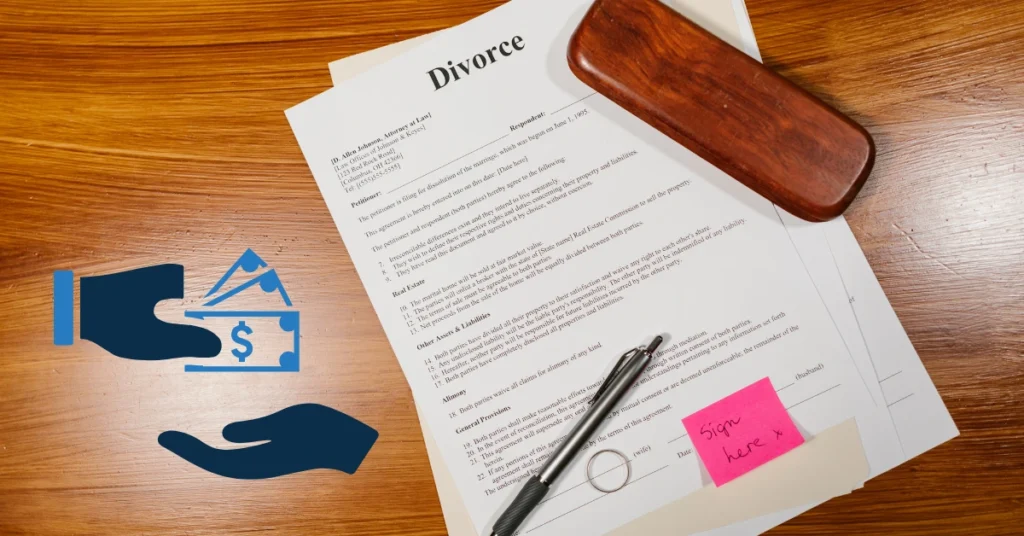Divorce is never an easy journey, and understanding the costs involved can add another layer of stress. If you’re wondering who pays for a divorce in Ireland, you’re not alone. The financial side of a divorce can often be just as complicated as the emotional aspects, and it’s crucial to know what you’re getting into. From solicitor fees to court costs, this article will break down everything you need to know to prepare yourself for what’s ahead.
Whether you’re just considering divorce or already in the process, understanding your financial responsibilities is key to navigating the path ahead with clarity. Let’s dive into the details.
Divorce in Ireland can be a complex and costly process, with various financial considerations to navigate. In general, the costs associated with a divorce are shared between both parties, but this can vary depending on the circumstances. Understanding who pays for what, and how these costs are allocated, is essential for managing your expectations.
Overview of Divorce Costs in Ireland
The financial costs of divorce in Ireland can include solicitor fees, court costs, and additional legal expenses like filing fees and document preparation. The total amount depends on the complexity of the case, the need for court appearances, and whether the divorce is contested or uncontested.
Financial Responsibility: Who Typically Covers the Costs?
Generally speaking, each party bears the expense of their own legal representation. However, there are situations where one party may be required to contribute to the other’s costs, particularly if there is a significant disparity in income or financial resources. In some cases, the court may order one spouse to pay the legal costs of the other.
Both Parties: Shared Costs or One Party Pays?
For contested divorces, each party usually pays for their own costs. However, in an uncontested divorce, where both parties agree on the terms of the divorce (such as the division of property and custody arrangements), the costs can sometimes be shared more equally. That said, the spouse with more financial resources may end up covering a larger share, especially if there is a clear imbalance in earnings or assets.
Factors Influencing the Payment
Several factors can influence how divorce costs are divided. These include:
- Income: The income level of both parties plays a significant role. The higher-earning spouse may be expected to pay more of the divorce costs, particularly if the other spouse has limited financial means.
- Assets: If there is a large difference in assets between the two parties, this may also affect how the costs are split. The court may consider the overall financial situation when determining responsibility for the costs.
- Children: The presence of children can also influence who pays for the divorce, especially when it comes to matters of custody, child maintenance, and the family home.
Role of a Solicitor and How They Impact Costs
The role of a solicitor is central to the divorce process. Solicitors will assist with filing the necessary paperwork, providing legal advice, and representing clients during court hearings. The complexity of the divorce whether it’s contested, involves children, or requires asset division will impact how much a solicitor charges. Solicitors may charge fixed fees or hourly rates, and the overall cost will depend on the time spent handling the case.

How Much Does a Divorce Cost in Ireland?
Divorce isn’t just tough emotionally it can also be expensive. If you’re wondering how much is a Divorce costs in Ireland, the short answer is: it varies. Costs depend on whether it’s contested or uncontested, how complex your case is, and which solicitor you hire. In this guide, I’ll break down the costs so you know what to expect and how to plan ahead.
Solicitor Fees: The Biggest Cost Factor
Hiring a solicitor is often the most expensive part of a divorce. In Ireland, solicitors typically charge in two ways: fixed fees or hourly rates.
- Fixed fees: Some solicitors offer a set price for an uncontested divorce, usually ranging from €1,500 to €3,000.
- Hourly rates: If your case is contested, meaning there are disputes over finances, children, or assets, your solicitor will likely charge per hour. Rates vary but usually fall between €200 and €400 per hour. This can add up quickly if court hearings and negotiations drag on.
The more complicated the case, the more hours your solicitor will need to put in meaning higher costs for you.
Court Costs: Filing Fees and Other Expenses
Aside from solicitor fees, there are official costs you’ll need to cover:
- Court filing fees: Around €150 to €200, depending on the type of application.
- Document preparation: Some cases require additional legal paperwork, which may cost another €100 to €300.
- Barrister fees: If your case goes to the Circuit Court or High Court, you may need a barrister, which can significantly increase costs.
Contested vs. Uncontested Divorce: The Cost Difference
One of the biggest factors affecting cost is whether your divorce is contested or uncontested:
- Uncontested divorce (both parties agree on everything): Costs range from €1,500 to €3,000.
- Contested divorce (disagreements over finances, children, or property): Costs can range from €10,000 to €20,000+, depending on complexity.
If you and your spouse can reach an agreement, you’ll save thousands of euros and a lot of stress.
Can You Get a Divorce Without a Solicitor?
Technically, yes. You can file for divorce yourself, especially in an uncontested case. However, the legal system can be tricky, and even a small mistake in paperwork could cause delays. Many people opt for a solicitor to ensure everything is handled correctly and efficiently.

Solicitor Fees for Divorce in Ireland
Divorce is already emotionally draining, and the financial side of it can make things even more stressful. One of the biggest costs you’ll face is solicitor fees. So, how much does a solicitor charge for a divorce in Ireland? The answer depends on a few factors, like whether your divorce is contested or uncontested, the complexity of your case, and the solicitor’s pricing structure. Let’s break it down in simple terms.
How Much Do Solicitors Charge for a Divorce in Ireland?
Solicitors in Ireland typically charge in two ways: fixed fees or hourly rates. If your divorce is straightforward and uncontested, some solicitors offer a fixed fee, usually between €1,500 and €3,000. This covers all the legal paperwork, filing, and court application fees.
But if your case is contested meaning there are disputes over finances, children, or property then the costs rise significantly. In these cases, solicitors often charge hourly rates, which can range from €200 to €400 per hour. Since a contested divorce can take months or even years to resolve, legal fees can easily add up to €10,000 or more.
Fixed Fees vs Hourly Rates: What’s the Difference?
- Fixed Fees: This is a set price that covers everything from consultation to filing paperwork. It’s best for uncontested divorces where both parties agree on the terms.
- Hourly Rates: If your divorce involves disputes over assets, child custody, or financial support, a solicitor will charge by the hour. The more complicated the case, the higher the final bill.
If you’re unsure which option suits your situation, it’s worth discussing with a solicitor upfront to get a clear cost estimate.
Pro Tip: If both parties can agree on terms before involving a solicitor, you can save thousands of euros.
Why Do Solicitor Fees Vary?
Not all divorces are the same, and solicitor fees reflect that. Here’s what can impact the cost:
- Complexity: The more issues to resolve (like child custody, financial disputes, or property division), the higher the fees.
- Time Spent in Court: More court appearances mean more legal fees.
- Experience of the Solicitor: Senior solicitors with years of experience tend to charge higher rates.
- Need for a Barrister: If your case goes to the Circuit or High Court, a barrister may be needed, adding extra costs.
Bottom Line: The more complicated your case, the higher the solicitor fees. If you and your spouse can agree on key issues beforehand, you’ll save money.
Can You Get a Divorce Without a Solicitor?
Technically, yes. You can apply for a divorce yourself, especially if it’s uncontested. However, divorce law in Ireland can be tricky, and even a small mistake in paperwork can cause delays. Many people choose a solicitor to ensure everything is handled correctly.
If you’re worried about costs, you might be eligible for free legal aid (more on that later). But if your case is simple and you’re confident navigating the process, DIY divorce could be an option.

How Much Does an Uncontested Divorce Cost in Ireland?
Divorce is never easy, but if you and your spouse agree on everything who gets what, where the kids will live, and how finances will be handled things get a lot simpler. That’s what’s called an uncontested divorce. And the best part? It’s much cheaper than a contested one.
What Is an Uncontested Divorce?
An uncontested divorce is when both parties agree on all the key issues division of assets, child custody, spousal support without needing a long legal battle. No court fights, no drawn-out disputes, just paperwork and official approval. Because there’s no major conflict, it takes less time, involves fewer legal fees, and costs significantly less.
How Much Does an Uncontested Divorce Cost in Ireland?
If you go the uncontested route, expect to pay anywhere from €1,500 to €3,000 in legal fees. This usually includes solicitor fees, court filing fees, and document preparation. Some solicitors offer fixed-fee divorce services, so you know exactly what you’re paying upfront.
Here’s a rough breakdown:
- Solicitor fees: €1,500 – €2,500 (depends on complexity)
- Court filing fees: Around €150 – €200
- Document preparation: €100 – €300 (if needed)
Steps Involved in an Uncontested Divorce
The process is straightforward:
- Meet with a solicitor – Even for an uncontested divorce, legal guidance helps ensure no mistakes.
- Draft and file the application – Your solicitor prepares the required documents.
- Serve the papers – The divorce papers must be officially delivered to your spouse.
- Court hearing – A judge reviews and approves the divorce if everything is in order.
- Final order granted – Once approved, your divorce is legally finalized.
If everything goes smoothly, the process can take around six months from start to finish.
Why Is an Uncontested Divorce Cheaper?
Simply put: less legal work, fewer court appearances, and no costly disputes. Since both parties are in agreement, there’s no need for multiple solicitor meetings, barristers, or long negotiations. You skip the drama and the extra expenses.

What Is a Wife Entitled to in a Divorce in Ireland?
It’s never enough to simply sign papers and move on after a divorce. It’s emotional, messy, and let’s be honest a financial rollercoaster. If you’re wondering what a wife is entitled to in a divorce in Ireland, you’re not alone. Money, property, and financial support are huge concerns, and understanding your rights can make a tough situation a little less stressful.
Financial Support: Is Alimony a Thing in Ireland?
Unlike in some countries, Ireland doesn’t have a fixed “alimony” system. Instead, the court may order spousal maintenance, which is financial support from one spouse to another. The amount depends on a few things:
- The income and financial situation of both spouses
- The needs of each spouse (e.g., housing, childcare, daily expenses)
- The length of the marriage
- Who is the primary caregiver for any children
If one spouse earns significantly more, they may be required to provide maintenance to help the lower-earning spouse maintain a reasonable standard of living. However, this isn’t automatic you’ll need to prove financial need.
Property Division: Who Gets What?
Dividing assets in a divorce isn’t just about fairness it’s about financial reality. Irish courts follow the principle of “proper provision”, meaning assets are divided based on what’s fair, not necessarily 50/50.
The court considers:
- Each spouse’s income, earning capacity, and financial needs
- The length of the marriage
- Contributions made by each spouse (financial or otherwise yes, raising kids and managing a home count!)
- The future financial security of both parties
The Family Home: Can She Stay?
The family home is often the biggest asset and the biggest emotional battle. If there are children involved, the court usually prioritizes stability, meaning the primary caregiver (often the wife) may get to stay in the home until the children are grown.
If there are no children, things get more complicated. Options include:
- One spouse buys out the other (if financially possible)
- Selling the house and splitting the proceeds
- One spouse stays, but ownership remains shared (common when kids are involved)
Pensions & Long-Term Financial Security
A pension is often a person’s biggest financial asset after the family home. In Ireland, pensions can be split in a divorce, meaning a wife may be entitled to a share of her spouse’s pension. The court can issue a Pension Adjustment Order (PAO) to divide pension benefits fairly.

Who Suffers Most Financially in a Divorce?
Divorce isn’t just about signing papers and moving on it’s a financial earthquake. When a marriage ends, so does the financial stability that came with it. But who takes the biggest hit? The truth is, both men and women feel the financial strain, just in different ways.
Gender Disparities: Who Feels the Financial Impact More?
Let’s be real money after divorce doesn’t just disappear; it shifts. And usually, it doesn’t shift evenly.
- Women Often Face a Steeper Drop in Income
Many women, especially those who stepped back from work to raise kids, find themselves at a financial disadvantage. Suddenly, they’re dealing with legal fees, a single income (or none at all), and the challenge of rebuilding their financial independence. Studies show that women’s income tends to drop significantly post-divorce, while men’s income remains more stable or even increases over time. - Men Face Heavy Financial Obligations
On the flip side, men often bear the brunt of financial responsibilities, from child support to spousal maintenance. If the wife stayed home to care for the kids, the husband may end up paying ongoing financial support, which can feel overwhelming especially if he’s also adjusting to the costs of living alone.
The Financial Burden of Raising Kids
If there are kids involved, things get even trickier. The parent who takes primary custody (often the mother) might get financial support, but let’s be honest it rarely covers everything. Groceries, school fees, clothes, extracurricular activities… it all adds up fast. Even with child maintenance payments, single-parent households often struggle to maintain the same standard of living as before.
Meanwhile, the other parent may feel the pinch too, balancing support payments while managing their own post-divorce expenses.
Lifestyle Changes: From Shared Wealth to Solo Survival
Divorce forces a lifestyle adjustment sometimes a brutal one.
- Downsizing Becomes the Norm
Moving from a shared home to a smaller place is common. For some, it’s a practical step; for others, it feels like losing a piece of their past. The cost of renting or buying a new place, plus the legal costs of property division, can be a financial headache. - Retirement Plans Take a Hit
If you spent years building a life together, chances are you were also building financial security joint savings, pensions, investments. Divorce can wipe out years of financial progress. Pensions often get divided, and savings accounts get split, leaving both parties with less for the future. - Debt and Legal Fees Linger
The financial impact doesn’t end when the divorce is finalized. Legal fees, credit card debt from the marriage, and ongoing obligations can make it hard for either party to fully move on financially.

Free Legal Aid for Divorce in Ireland
Divorce can be tough enough without worrying about how to pay for a solicitor. If money is tight, the good news is that you might be able to get free legal aid in Ireland. It’s designed to help people who can’t afford the cost of a solicitor during their divorce. But, how does it work? Let me break it down for you.
Who Can Get Free Legal Aid?
Not everyone is eligible for free legal aid, but it’s worth checking if you qualify. The eligibility mainly depends on your income and savings. If you’re struggling financially, you might be in luck. The rules are there to make sure that people with limited means aren’t left without legal support during something as important as a divorce.
When you apply, you’ll need to provide proof of your financial situation. This includes things like pay slips, bank statements, and information about any government benefits you receive. If your income is below a certain level and you don’t have much saved, then you could be eligible for help. The process can be a little paperwork-heavy, but it’s worth the effort if it means you can get the legal help you need.
How Do You Apply for Legal Aid?
The application process for legal aid is pretty straightforward, though it may take some time. You’ll need to fill out an application form, which you can get at your local legal aid office or download online. Along with the form, you’ll need to show proof of your finances. This helps them understand your situation and decide whether you qualify.
Your application goes through a review procedure after it is submitted. If they approve your case, they’ll assign a solicitor to handle your divorce. In some cases, there may be a waiting period before you hear back, so it’s a good idea to apply as early as possible.
What Does Legal Aid Cover?
If you qualify for legal aid, it can cover a lot of the costs that come with a divorce. This includes getting advice, having a solicitor represent you in court, and helping with paperwork. However, there are still some costs that might not be covered. For example, court filing fees or other small charges could still apply. But overall, legal aid can save you from the high costs of hiring a solicitor privately.
If you’re eligible, this can be a huge relief. Going through a divorce is already stressful enough without worrying about paying for a solicitor. Legal aid is there to make sure that everyone, no matter their financial situation, has access to the legal support they need to move forward with their life.

New Divorce Law in Ireland (2019): What You Need to Know
Divorce in Ireland changed a lot in 2019. If you’re thinking about getting divorced, or you’re already in the middle of the process, you’ll want to know what’s different now. The changes were meant to make things a little easier for everyone. Let me break it down for you.
First, the law got simpler. It’s not as complicated as it used to be. Things move a bit quicker now, which can feel like a relief when you’re already dealing with the emotional side of a breakup. The goal was to reduce the stress, and I have to say, it seems to work.
Another big change is the waiting period. Before 2019, you only had to be apart for a year before filing for divorce. But now, you have to wait two years. It’s a bit longer, but it gives both parties more time to think things through. Maybe even decide if divorce is really the best choice after all.
So, how does all of this affect you? Well, these changes mean less paperwork and a quicker divorce process, which can lower the cost. But with the extra waiting time, you might find it harder to keep separate lives going, especially if you’re financially stretched. Still, the overall aim is to make it more straightforward and less expensive.
Financial Resources in Divorce: The Affidavit of Means
Going through a divorce isn’t just emotionally draining it can be financially overwhelming too. If you’re wondering how your financial situation will be handled, the Affidavit of Means plays a big role. It’s one of those legal documents you’ll need to fill out, and it essentially tells the court how much you and your ex-partner are earning, what you owe, and how much you’ve got tucked away in savings. Think of it as your financial “report card” that helps everyone get on the same page when it comes to dividing things up.
What is the Affidavit of Means and Why is It Important?
The Affidavit of Means is a formal document that lays out your entire financial situation. It’s a snapshot of your income, expenses, assets, and debts. While it might seem like a lot of paperwork to fill out, it’s incredibly important because it helps the court figure out things like spousal support or child maintenance. The court needs to know your financial position to make fair decisions about how resources should be divided. Without it, you wouldn’t be able to show that you really can’t afford something, or that your ex has a more stable financial situation than they’re letting on.
How It Helps Determine Financial Contributions and Support
This form can have a big impact on how much support you or your ex might get. For example, if one person earns significantly more than the other, the Affidavit of Means helps show the imbalance. The court uses this information to figure out if there should be maintenance (spousal or child support) and how much it should be. The clearer and more accurate your affidavit is, the more likely it is that the financial decisions made will be fair and reasonable.
What Documents Are Required for the Affidavit of Means?
Now, I know paperwork is probably the last thing you want to deal with during a divorce, but the Affidavit of Means isn’t something you can skip. To fill it out, you’ll need several documents that give a detailed picture of your finances. These include:
- Payslips or proof of income: This helps show what you earn, whether it’s from a job or any other source (like benefits).
- Bank statements: These provide a snapshot of your savings, current accounts, and how much you spend each month.
- P60 or P21: These documents will show your total annual income, which is essential for accurate reporting.
- Debt statements: If you owe any money (like a loan or mortgage), you’ll need to provide proof of the amounts.
- Other financial assets: If you have property, investments, or pensions, you’ll need to list them as well.
Once you have all this paperwork, you’ll be in a good position to complete the affidavit.
Conclusion
Divorce in Ireland can be costly, but there are options to help, like legal aid for those who qualify. Generally, each person covers their own costs, but sometimes the court may ask one spouse to contribute. The process can take time, but the changes in 2019 made things simpler. It’s always a good idea to talk to a solicitor to make sure you’re making the right decisions for your situation.
Frequently Ask Question
Can I get a divorce in Ireland without a solicitor?
Yes, it is possible to get a divorce in Ireland without a solicitor, but it can be complex. If you and your spouse agree on the terms of the divorce, you might be able to handle it yourself by submitting the necessary paperwork. However, it’s generally recommended to seek legal advice to ensure all aspects, such as division of assets or custody arrangements, are handled properly.
How much does a contested divorce cost in Ireland?
The cost of a contested divorce in Ireland can vary widely depending on the complexity of the case. Typically, legal fees can range from €5,000 to €15,000 or more. Keep in mind, additional costs like court fees and expert witnesses could increase the total cost. If you’re unsure about the costs, consider discussing payment plans with your solicitor.
Do I need to go to court for an uncontested divorce?
No, you don’t need to go to court for an uncontested divorce if you and your spouse agree on all the terms. You can submit the divorce application to the court, and if everything is in order, the court may grant the divorce without requiring your attendance. However, the process can take a few months.
What happens to the family home in a divorce?
In Ireland, the family home is typically divided between both spouses. The court considers various factors such as the needs of the children, the financial situation of both parties, and the contributions made by each spouse. In some cases, one spouse may buy out the other, or the property may be sold and proceeds divided.
How long does a divorce take in Ireland?
The time it takes to get a divorce in Ireland can vary depending on whether it’s contested or uncontested. An uncontested divorce could take around 3 to 6 months, while a contested divorce might take a year or more, especially if there are complicated issues like child custody or property division.











